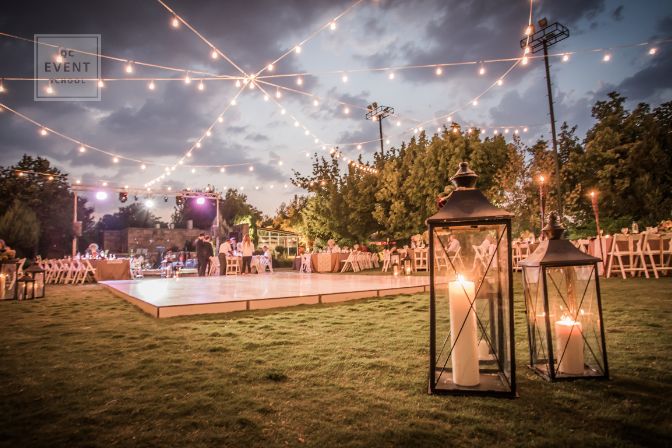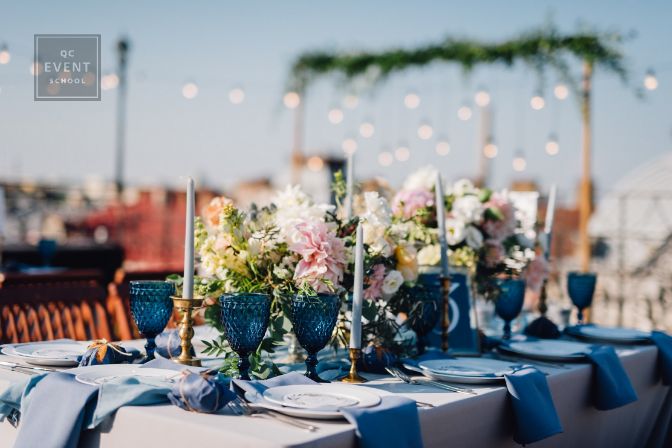
General Tips, Your Event Career
7 Important Skills Every Event Planner Should Have
If you’re looking to start a career in event planning, or you’re just looking to brush up on your skills, then you’ve come to the right place. In this article, we’ll discuss the 7 most important skills that every event planner should have! These skills will help you thrive and be successful in the professional event planning industry.
So whether you’re just starting out, or you’ve been planning events for years, make sure to read on!
Pro Tip: Before we dive in, have you checked out our Ultimate Guide on how to become an event planner (even with no experience)? It’s definitely a MUST read!
What Does an Event Planner Do?
An event planner is responsible for the coordination and execution of events. This can include weddings, conferences, parties, festivals, and more! Event planners work with clients to determine their needs and wants for the event, and then they coordinate with vendors to ensure that everything runs smoothly on the day of the event.
Event planners need to be organized, creative, and have excellent communication skills. They also need to be able to think on their feet and problem solve, as things don’t always go according to plan!
Now that we’ve covered what an event planner does, let’s move on to discussing the important skills that every event planner should have.
What Are The 7 Elements of Event Planning?
The event planning industry is booming and there are plenty of opportunities for those with the right skillset. However, becoming a successful event planner takes more than just organizing a few parties.
There are 7 key steps that go into putting together any event:
- Research
- Conceptualize
- Design
- Plan
- Organize
- Implement
- Evaluate
Each step is crucial to the success of an event and requires its own unique set of skills. Let’s now break these down…
7 Critical Event Planning Skills You’ll Need to Pull Off a Flawless Event
1. Research Skills
The first step in any event planning process is research. This includes everything from researching the venue to gathering data on potential attendees. Event planners must be able to find relevant information quickly and efficiently in order to make informed decisions about their event.
They must also be able to evaluate different sources of information and determine which ones are reliable and accurate. Furthermore, event planners must be able to understand and apply market research in order to better understand their target audience.
Key Takeaway: Event planners must be able to quickly find relevant information, evaluate different sources of information, and understand and apply market research.
2. Conceptualization Skills
After the initial research phase, it’s time to start conceptualizing the event. This is where event planners need to be able to think outside the box and come up with creative ideas that will make their event stand out from the rest.
They must also be able to take into consideration the various elements that will make up their event, such as the theme, decor, food, entertainment, and so on. Event planners must have a clear vision for their event and be able to communicate this vision to their team members and clients.
Key Takeaway: Event planners must be able to think outside the box, come up with creative ideas, and have a clear vision for their event.
Fun Fact: By adding event decor certification training to your resume, you can better conceptualize your client’s special day and take it to the next level! Learn more about QC Event School‘s self-paced, online Event Decor Course and get started today!
3. Design Skills
After the event has been conceptualized, it’s time to start designing it. This is where event planners need to be able to put their creative skills to the test and come up with a visually appealing event that will wow attendees.
Event planners must be able to understand principles of design, such as color theory, layout, and typography. They must also be skilled in using various design software programs, such as Adobe Photoshop and Illustrator.
Key Takeaway: Event planners must be able to understand principles of design and use various design software programs.
4. Planning Skills
Once the event has been designed, it’s time to start planning it. This is where event planners need to be able to take all of the various elements that make up their event and put them into a detailed plan.
Event planners must be able to create timelines, budgets, and schedules. They must also be able to coordinate with different vendors and service providers. Furthermore, event planners must be able to anticipate potential problems and have contingency plans in place.
Key Takeaway: Event planners must be able to create timelines, budgets, schedules, and coordinate with different vendors. They must also be able to anticipate potential problems and have contingency plans in place.
Did you know that you can learn ALL of these skills (and more) in QC Event School’s online Event & Wedding Planning Course? In as little as 3-6 months, become a globally-certified International Event and Wedding Planning Professional™ (IEWP®)!
5. Organization Skills
One of the most important skills that every event planner should have is organization. Event planners must be able to keep track of all of the different elements that make up their event and make sure that everything is running smoothly.
They must also be able to stay calm under pressure and think on their feet. Furthermore, event planners must be able to effectively communicate with their team members and clients. This is why organization is one of the top skills of event planners that need to be in your repertoire!
Key Takeaway: Event planners must be able to keep track of all of the different elements that make up their event, stay calm under pressure, and effectively communicate with their team members and clients.
6. Implementation Skills
After the event has been planned, it’s time to start implementing it. This is where event planners need to be able to take all of the various elements of their event and actually put them into action.
Event planners must be able to set up and decorate the event space, coordinate with different vendors, and make sure that everything is running smoothly on the day of the event. Moreover, they must also be able to troubleshoot any problems that may arise.
Key Takeaway: Event planners must be able to set up and decorate the event space, coordinate with different vendors, and make sure that everything is running smoothly on the day of the event.
7. Evaluation Skills
Last but not least, event planners must be able to look back and reflect on their event after it’s over. They must be able to take a step back and objectively assess what went well – and what could be improved for future events.
Event planners must also be able to provide feedback to their clients and team members. This is why evaluation skills are so important!
Key Takeaway: Event planners must be able to evaluate their event after it’s over and provide feedback to their clients and team members.
Important Skills Every Event Planner Should Have: Hard Skill Requirements
The event planning industry is one that requires a unique blend of both hard skills and soft skills. Hard skills are the technical, measurable, and teachable abilities that you need to perform a specific task or job.
Some examples of hard skills that every event planner should have include:
- Budgeting
- Marketing
- Event design
- Project management
As you can see, these are all essential skills that every event planner needs in order to be successful. However, possessing the right hard skills is not enough – you also need to have the right soft skills, too!
Soft Skill Requirements in Event Planning
In contrast to hard skills, which are technical and measurable abilities, soft skills are personal attributes that enable you to interact effectively with other people.
Some examples of soft skills that every event planner should have include:
- Communication
- Interpersonal skills
- Leadership
- Organization
- Creativity
These are just a few examples of the essential soft skills that every event planner needs in order to be successful. As you can see, both hard skills and soft skills are key for an event planner’s success!
So, what does this all mean for YOU? If you’re interested in becoming an event planner, it’s important to develop both your hard and your soft skills. Luckily, QC Event School can help you do just that! With our self-paced, online certification programs, you’ll learn all of the essential skills that you need to be a successful event planner!
Check out our full list of available courses here!
What Are The 5 C’s of Event Management?
As we’ve established by now, the event planning industry is one that requires a high level of skill and experience. After all, there are many different aspects to event management. This is why it’s also extremely important to have a firm understanding of the basics BEFORE you dive headfirst into your career.
As an event planner, one of the most important things you’ll need to understand is the “Five C’s.” The Five C’s are:
- Concept
- Coordination
- Control
- Culmination
- Closeout
Each of these aspects is essential for a successful event. Let’s take a closer look at each one in turn:
Concept:
This is the “idea” or “theme” of your event. What are you trying to achieve? What is the overall message that you want to communicate?
Coordination:
This is the process of putting all of the different pieces of your event together. This includes everything from booking vendors to decorating the event space.
Control:
Once your event is underway, it’s important to be able to keep everything under control. This means being able to troubleshoot any problems that may arise and making sure that everything stays on track.
Culmination:
The culmination is the climax of your event – when all of your hard work comes together!
Closeout:
After your event is over, it’s important to debrief and evaluate what went well and what could be improved for future events. This is also the stage where you’ll want to wrap up and collect any outstanding payments, collect a testimonial from your client, etc.
As you can see, the Five C’s are essential for any truly successful event. So, if you’re interested in becoming an event planner, make sure to brush up on your knowledge of the basics!
What is THE Most Important Planning Skill?
Now that we’ve gone over some of the most important skills that every event planner should have, you might be wondering: what is THE most important planning skill?
The answer, quite simply, is experience.
There’s no substitute for experience when it comes to event planning. The more events you plan, the better you’ll become at troubleshooting problems, managing your time, and dealing with difficult clients.
Of course, getting experience can be tough – especially if you’re just starting out in your career. This is why internships, entry-level jobs, and shadowing experienced planners can be so helpful. These opportunities give you the chance to get your foot in the door and start gaining the valuable experience that you need to succeed.
So, if you’re interested in becoming an event planner, make sure to get started on gaining experience as soon as possible!
Interested in event starting your very own event planning business? This guide will break down everything you need to know in 6 easy steps!
How To Improve Event Management Skills
Lastly, if you’re already working in the event planning industry and looking for ways to improve your skills, here are a few suggestions:
- Read industry-related articles and blog posts (like this one!)
- Attend conferences and networking events
- Join a professional organization, such as the International Live Events Society (ILEA) or the National Association for Catering and Events (NACE)
- Complete an internship, shadow a working event planner, and/or apply for an entry-level job in the field
Each of these activities will help you learn more about the event planning industry and hone your skills.
Another route we HIGHLY recommend is completing a reputable certification course – and then taking additional courses throughout your career to add to your qualifications! A certification will not only give you the skills and knowledge you need to succeed; it will also make you more attractive to clients and employers alike, and help you stand out in a competitive industry!
Conclusion
Whether you’re just starting out in your event planning career or you’re a seasoned pro, we hope that this article has given you some valuable insight into the skills that you need to succeed.
Remember: experience is key, so make sure to get started on gaining as much experience as possible! And if you’re looking to take your career to the next level, consider getting certified – it could be the best decision you ever make for your event planning business!





